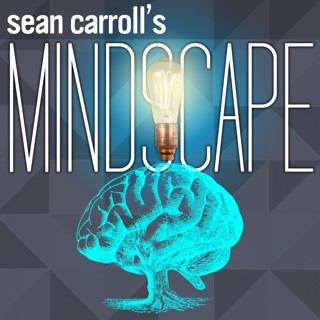
146 | Emily Riehl on Topology, Categories, and the Future of Mathematics
“A way that math can make the world a better place is by making it a more interesting place to be a conscious being.” So says mathematician Emily Riehl near the start of this episode, and it’s a good summary of what’s to come. Emily works in realms of topology and category theory that are far away from practical applications, or even to some non-practical areas of theoretical physics. But they help us think about what is possible and how everything fits together, and what’s more interesting than that? We talk about what topology is, the specific example of homotopy — how things deform into other things — and how thinking about that leads us into groups, rings, groupoids, and ultimately to category theory, the most abstract of them all.Support Mindscape on Patreon.Emily Riehl received a Ph.D in mathematics from the University of Chicago. She is currently an associate professor of mathematics at Johns Hopkins University. Among her honors are the JHU President’s Frontier Award and the Joan & Joseph Birman Research Prize. She is author of Categorical Homotopy Theory, and co-author of the upcoming Elements of ∞-Category Theory. She competed on the United States women’s national Australian rules football team, where she served as vice-captain.Johns Hopkins web pageGoogle Scholar publicationsQuanta profileWikipediaTwitterSee Privacy Policy at https://art19.com/privacy and California Privacy Notice at https://art19.com/privacy#do-not-sell-my-info.
10 Touko 20211h 16min

145 | Niall Ferguson on Histories, Networks, and Catastrophes
The world has gone through a tough time with the COVID-19 pandemic. Every catastrophic event is unique, but there are certain commonalities to how such crises play out in our modern interconnected world. Historian Niall Ferguson wrote a book from a couple of years ago, The Square and the Tower, that considered how an interplay between networks and hierarchies has shaped the history of the world. This analysis is directly relevant to how we deal with large-scale catastrophes, which is the subject of his new book, Doom: The Politics of Catastrophe. We talk about global culture as a complex system, and what it means for our ability to respond to crisis.Support Mindscape on Patreon.Niall Ferguson received his D.Phil. degree from the University of Oxford. He is currently the Milbank Family Senior Fellow at the Hoover Institution, Stanford University, a senior faculty fellow of the Belfer Center for Science and International Affairs at Harvard, and a visiting professor at Tsinghua University, Beijing. He is the author of numerous book, several of which have been adapted into television documentaries, and has helped found several different companies. He won an international Emmy for his PBS series The Ascent of Money, and has previously been named one of the 100 most influential people in the world by Time magazine.Web siteHoover Institution web pageAmazon author pageWikipediaTwitterSee Privacy Policy at https://art19.com/privacy and California Privacy Notice at https://art19.com/privacy#do-not-sell-my-info.
3 Touko 20211h 25min

144 | Solo: Are We Moving Beyond the Standard Model?
I’ve been a professional physicist since the 1980’s, and not once over the course of my career has a particle-physics experiment produced a completely surprising new result. We’ve discovered particles (top quark, Higgs boson) and even phenomena (neutrino masses), but nothing we hadn’t either predicted or could easily accommodate within the Standard Model of particle physics. That might have changed just this month, with possible confirmations of two “anomalies” in particle-physics measurements involving muons. They might be new physics, or they might just go away. I talk about what it might mean, and (more importantly) how we should feel about the likelihood that these results really do imply physics beyond the Standard Model.Support Mindscape on Patreon.Here are some relevant references for the first result, from LHCb at CERN, that B-mesons are seemingly decaying at different rates into electrons and muons:arxiv paperCERN CourierScientific AmericanResonaancesAnd here are some references for the other result, from the Muon g-2 experiment at Fermilab, on the anomalous magnetic moment of the muon:arxiv paperFermilab articleLattice QCD calculationQuantaArs TechnicaResonaancesMoving the g-2 ring from Brookhaven to FermilabSee Privacy Policy at https://art19.com/privacy and California Privacy Notice at https://art19.com/privacy#do-not-sell-my-info.
26 Huhti 20211h 11min

143 | Julia Galef on Openness, Bias, and Rationality
Mom, apple pie, and rationality — all things that are unquestionably good, right? But rationality, as much as we might value it, is easier to aspire to than to achieve. And there are more than a few hot takes on the market suggesting that we shouldn’t even want to be rational — that it’s inefficient or maladaptive. Julia Galef is here to both stand up for the value of being rational, and to explain how we can better achieve it. She distinguishes between the “soldier mindset,” where we believe what we’re told about the world and march toward a goal, and the “scout mindset,” where we’re open-minded about what’s out there and always asking questions. She makes a compelling case that all things considered, it’s better to be a scout.Support Mindscape on Patreon.Julia Galef received a BA in statistics from Columbia University. She is currently a writer and host of the Rationally Speaking podcast. She was a co-founder and president of the Center for Applied Rationality. Her new book is The Scout Mindset: Why Some People See Things Clearly and Others Don’t.Web siteRationally Speaking podcastNew York magazine profileWikipediaTwitterSee Privacy Policy at https://art19.com/privacy and California Privacy Notice at https://art19.com/privacy#do-not-sell-my-info.
19 Huhti 20211h 32min

AMA | April 2021
Welcome to the April 2021 Ask Me Anything episode of Mindscape! These monthly excursions are funded by Patreon supporters (who are also the ones asking the questions). I take the large number of questions asked by Patreons, whittle them down to a more manageable size — based primarily on whether I have anything interesting to say about them, not whether the questions themselves are good — and sometimes group them together if they are about a similar topic. Enjoy!Support Mindscape on Patreon.See Privacy Policy at https://art19.com/privacy and California Privacy Notice at https://art19.com/privacy#do-not-sell-my-info.
14 Huhti 20212h 41min

142 | Charlie Jane Anders on Stories and How to Write Them
Telling a story seems like the most natural, human thing in the world. We all do it, all the time. And who amongst us doesn’t think we could be a fairly competent novelist, if we just bothered to take the time? But storytelling is a craft like any other, with its own secret techniques and best practices. Charlie Jane Anders is a multiple-award-winning novelist and story writer, but also someone who has thought carefully about all the ingredients of a good story, from plot and conflict to characters and relationships. This will be a useful conversation for anyone who tells stories, reads novels, or watches movies. Maybe you’ll be inspired to finally write that novel.Support Mindscape on Patreon.Charlie Jane Anders studied English and Asian literature at Cambridge University. She is the author of over 100 published works of short fiction and several novels, including the new Young Adult book Victories Greater Than Death. She was co-founder of the website io9, a blog about science and science fiction. She is a frequent event organizer, including the monthly Writers With Drinks. Among her accolades are Hugo, Nebula, Locus, Sturgeon, and Crawford awards. She is the co-host, with Annalee Newitz, of the Our Opinions Are Correct podcast. Later this year she will publish Never Say You Can’t Survive: How to Get Through Hard Times by Making Up Stories.Web siteWikipediaAmazon author pageTwitterSee Privacy Policy at https://art19.com/privacy and California Privacy Notice at https://art19.com/privacy#do-not-sell-my-info.
12 Huhti 20211h 26min

141 | Zeynep Tufekci on Information and Attention in a Networked World
In a world flooded with information, everybody necessarily makes choices about what we pay attention to. This basic fact can be manipulated in any number of ways, from advertisers micro-targeting specific groups to repressive governments flooding social media with misinformation, or for that matter well-meaning people passing along news from sketchy sources. Zeynep Tufekci is a sociologist who studies the flow of information and its impact on society, especially through social media. She has provided insightful analyses of protest movements, online privacy, and the Covid-19 pandemic. We talk about how technology has been shaping the information space we all inhabit.Support Mindscape on Patreon.Zeynep Tufekci received a Ph.D. in sociology from the University of Texas-Austin. She is currently an Associate Professor in the School of Information and Library Science at the University of North Carolina, Chapel Hill, and will be a Visiting Professor at the Craig Newmark Center for Journalism Ethics and Security at Columbia University. She is the author of Twitter and Tear Gas: The Power and Fragility of Networked Protest. Her writing has appeared in The New York Times, Scientific American, The Atlantic, and elsewhere, and she publishes the Insight newsletter on Substack.Web siteUNC web pageInsight @ SubstackGoogle Scholar publicationsNew York Times profileWikipediaTwitterSee Privacy Policy at https://art19.com/privacy and California Privacy Notice at https://art19.com/privacy#do-not-sell-my-info.
5 Huhti 20211h 17min

140 | Dean Buonomano on Time, Reality, and the Brain
“Time” and “the brain” are two of those things that are somewhat mysterious, but it would be hard for us to live without. So just imagine how much fun it is to bring them together. Dean Buonomano is one of the leading neuroscientists studying how our brains perceive time, which is part of the bigger issue of how we construct models of the physical world around us. We talk about how the brain tells time very differently than the clocks that we’re used to, using different neuronal mechanisms for different timescales. This brings us to a very interesting conversation about the nature of time itself — Dean is a presentist, who believes that only the current moment qualifies as “real,” but we don’t hold that against him.Support Mindscape on Patreon.Dean Buonomano received his Ph.D. from the Department of Neurobiology and Anatomy at the University of Texas Medical School, Houston. He is currently a Professor in the Department of Neurobiology at UCLA. His lab studies how the brain perceives time and constructs models of the external physical world. He is the author of Brain Bugs: How the Brain’s Flaws Shape our Lives and Your Brain is a Time Machine: The Neuroscience and Physics of Time.Lab web siteUCLA web pageGoogle Scholar publicationsAmazon.com author pageWikipediaTwitterSee Privacy Policy at https://art19.com/privacy and California Privacy Notice at https://art19.com/privacy#do-not-sell-my-info.
29 Maalis 20211h 27min





















